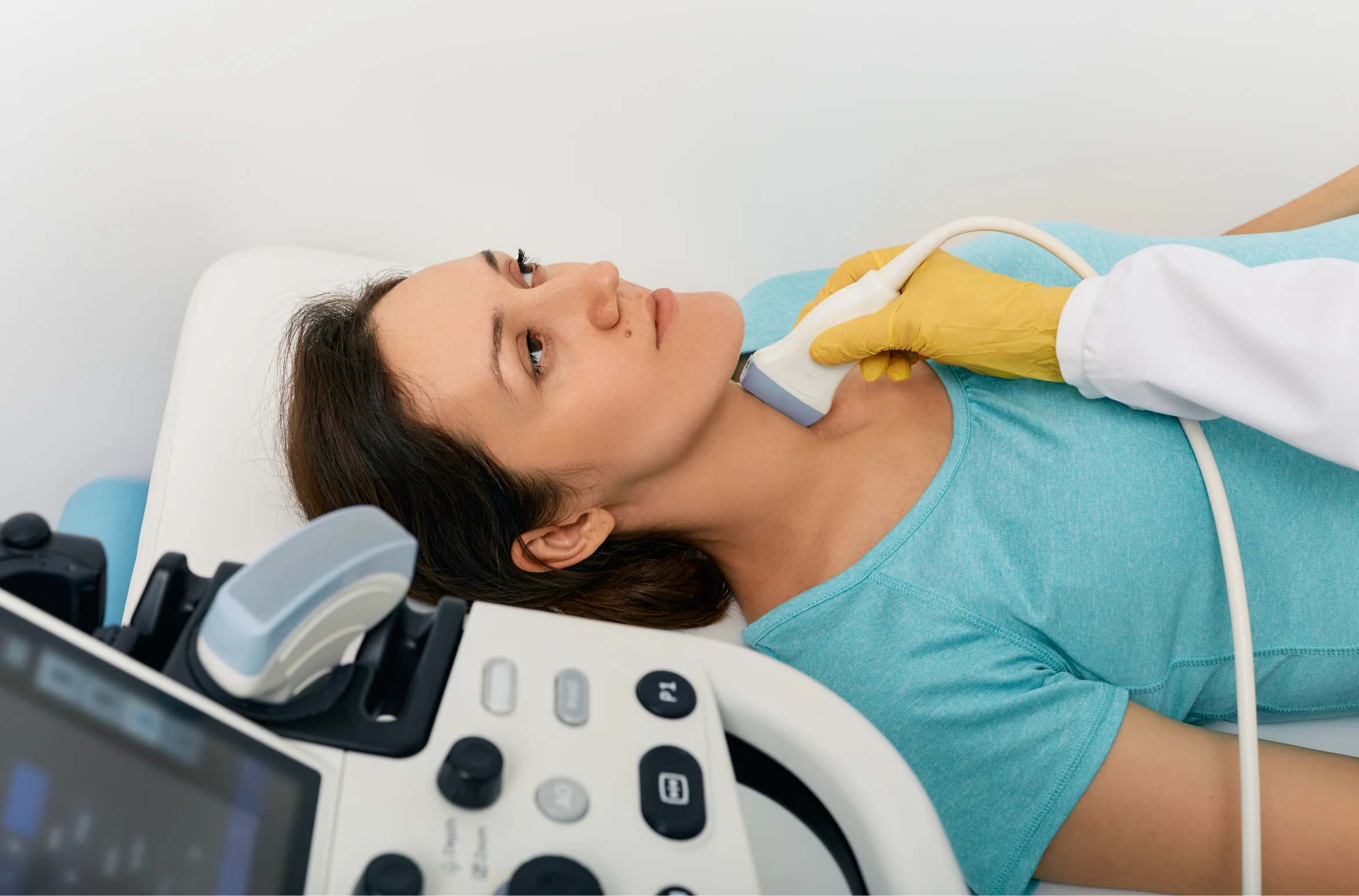
Understanding Hyperthyroidism Symptoms in Menopause: A Guide to Thyroid Health for Women
You’re in your 40s or 50s. Your periods are erratic. You feel anxious, sweaty, and exhausted — but also, strangely, you’ve lost weight without trying. These might sound like typical menopause changes, but they could also be something more specific: hyperthyroidism symptoms.
The thyroid and menopause are closely linked. And because the symptoms of thyroid imbalance and menopause often overlap, it can be easy to miss what your body is really trying to tell you.
In this guide, we break down what hyperthyroidism symptoms look like, how they interact with menopause, and why it’s crucial to take your thyroid health seriously during midlife.
What is Hyperthyroidism?
Hyperthyroidism is a condition where your thyroid gland produces more thyroid hormones than your body needs. These hormones — T3 (triiodothyronine) and T4 (thyroxine) — play a major role in regulating your metabolism, energy levels, heart rate, and even mood.
When these hormones are in excess, your body speeds up — sometimes to an uncomfortable and unhealthy degree. This leads to hyperthyroidism symptoms like unexplained weight loss, anxiety, rapid heartbeat, and sleep disturbances — all of which can be mistaken for menopause-related changes.
How Hyperthyroidism and Menopause Interact
Both menopause and thyroid disorders involve major hormonal shifts. And in many women, symptoms like hot flashes, mood swings, fatigue, and irregular periods may already feel overwhelming. Throw in an overactive thyroid, and things can get even more intense.
What’s tricky is that hyperthyroidism symptoms and menopause symptoms are often similar — which means thyroid issues can easily be overlooked or misdiagnosed in midlife women.
Key Hyperthyroidism Symptoms to Watch For
Here are some of the most common hyperthyroidism symptoms that often get mistaken for menopause:
1. Unexpected Weight Loss
Losing weight despite a regular (or even increased) appetite can be a red flag. Unlike typical midlife weight gain, this kind of weight loss is often rapid and unexplained.
2. Rapid Heartbeat or Palpitations
A racing heart, especially at rest or during sleep, can indicate your thyroid is working overtime.
3. Increased Sweating and Heat Intolerance
Do you feel overheated even when others are comfortable? Excessive sweating and a constant feeling of warmth may be linked to hyperthyroidism, not just hot flashes.
4. Anxiety and Mood Changes
Heightened nervousness, irritability, or panic attacks can be driven by high thyroid hormone levels. This emotional rollercoaster is often chalked up to menopause — but it’s worth checking your thyroid.
5. Muscle Weakness and Fatigue
Hyperthyroidism can break down muscle tissue, leading to weakness and persistent fatigue, especially in your arms and legs.
6. Menstrual Irregularities
While irregular cycles are common in perimenopause, thyroid dysfunction can also shorten or lengthen menstrual periods, or stop them altogether.
Sleep Problems
Restlessness, insomnia, or waking up with a racing heart are all signs that may fall under hyperthyroidism symptoms, especially when they persist without another clear cause.
Why Hyperthyroidism is Often Missed in Menopausal Women
Many healthcare providers may not immediately suspect thyroid issues in women going through menopause. After all, both conditions share similar signs — including many hyperthyroidism symptoms like anxiety, fatigue, and irregular periods. This overlap can lead to misdiagnoses, with women being treated for depression, anxiety, or “just aging” when the real issue lies with the thyroid gland.
That’s why awareness is key. If you’ve been feeling “off” and menopausal explanations don’t fully add up, it’s worth digging deeper.
Who’s Most at Risk?
While hyperthyroidism can affect anyone, the risk increases if:
- You’re a woman over 40
- You have a family history of thyroid disease
- You have an autoimmune condition like Graves’ disease or Type 1 diabetes
- You’ve had thyroid surgery or high iodine exposure
- You’ve recently gone through pregnancy (postpartum thyroiditis)
It’s also worth noting that autoimmune disorders become more common as women age — and hyperthyroidism is often autoimmune in origin.
Getting Diagnosed: What Tests Should You Ask For?
If you suspect a thyroid issue, ask your doctor for a full thyroid function test panel. These blood tests typically include:
- TSH (Thyroid Stimulating Hormone): This is usually low in hyperthyroidism.
- Free T3 and Free T4: These hormones will be elevated.
- Thyroid antibodies: To check for autoimmune causes like Graves’ disease.
You don’t need to be an expert to advocate for yourself — but knowing the names of these thyroid function tests helps ensure your symptoms are taken seriously.
Managing Hyperthyroidism Symptoms During Menopause
If you’re diagnosed with hyperthyroidism, treatment depends on the cause and severity. Options include:
- Antithyroid Medications
These drugs help reduce the production of thyroid hormones and are often the first line of treatment. - Radioactive Iodine Therapy
This treatment destroys overactive thyroid cells, gradually reducing hormone levels. - Beta Blockers
These don’t treat the thyroid directly but can help control hyperthyroidism symptoms like rapid heartbeat and anxiety. - Surgery
In rare cases, a thyroidectomy (removal of the thyroid gland) may be recommended. - Lifestyle Support
- Eat nutrient-rich foods (especially selenium and iodine)
- Avoid extreme stress, which can worsen symptoms
- Engage in light exercise to protect bone and muscle health
- Prioritize sleep, even if you need to make changes to your environment or routine
The Thyroid-HRT Connection: Should You Be Concerned?
If you’re on hormone replacement therapy (HRT), you might wonder if it impacts your thyroid. While HRT doesn’t typically cause thyroid disorders, it can influence how thyroid hormones circulate in the body. Your doctor may need to adjust your dosage of thyroid medications if you’re using both.
The bottom line? If you’re on HRT and still struggling with hyperthyroidism symptoms like anxiety, insomnia, or weight loss, it’s time to re-check your thyroid function.
Final Thoughts: Listen to Your Body
At this stage in life, you’ve likely spent years caring for others — it’s time to start listening to yourself. Whether it’s fatigue, mood swings, or hot flashes, don’t assume it’s just menopause.
Hyperthyroidism symptoms are real, treatable, and too often overlooked. A simple blood test can give you clarity. And getting the right diagnosis can make the difference between simply surviving midlife and thriving in it.
FAQs
Yes. Chronic stress can exacerbate autoimmune responses, potentially triggering or worsening conditions like Graves' disease — a common cause of hyperthyroidism. Since menopause already strains your hormonal balance, managing stress becomes even more essential during this phase.
Yes. In some cases, especially with Graves’ disease, hyperthyroidism can lead to symptoms like dry eyes, bulging eyes (exophthalmos), blurred vision, or sensitivity to light. These aren’t typically associated with menopause, so they can help signal a thyroid-specific issue.
Absolutely. Excess thyroid hormones speed up bone turnover, which can lead to bone loss. This risk is even higher during menopause when estrogen levels drop — making it crucial to monitor both bone and thyroid health together.
Yes. High-iodine foods (like seaweed), excessive caffeine, and processed foods can intensify symptoms in some people. Women with hyperthyroidism are often advised to monitor their intake of these and consult a nutritionist for a tailored diet plan.
Biotin (often found in hair and nail supplements) can interfere with lab tests and lead to inaccurate thyroid results. If you're being tested for thyroid function, let your doctor know about any supplements you're taking.

Sonakshi Kandhari





